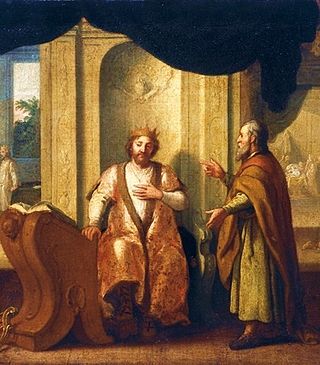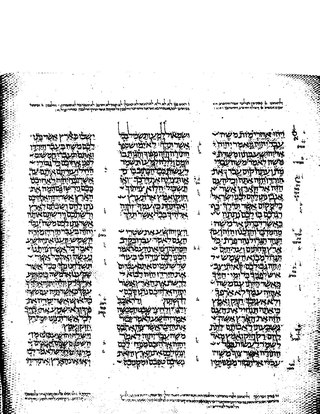Hebrew is a language native to Israel.

Rahab was, according to the Book of Joshua, a woman who lived in Jericho in the Promised Land and assisted the Israelites in capturing the city by hiding two men who had been sent to scout the city prior to their attack. In the New Testament, she is lauded both as an example of a saint who lived by faith, and as someone "considered righteous" for her works.
A sack usually refers to a rectangular-shaped bag.

Boaz is a biblical figure appearing in the Book of Ruth in the Hebrew Bible and in the genealogies of Jesus in the New Testament and also the name of a pillar in the portico of the historic Temple in Jerusalem. The word is found 24 times in the Scriptures, two being in Greek.
Rahab is used in the Hebrew Bible to indicate pride or arrogance, a mystical sea monster, as an emblematic or poetic name for Egypt, and for the sea.

Tannin or Tunnanu was a sea monster in Canaanite and Hebrew mythology used as a symbol of chaos and evil.

Nathan is a masculine given name. It is derived from the Hebrew verb נָתָן meaning gave. The meaning of the name in Jewish culture could be rendered "he has given" "gift from God"

Raziel, is an angel within the teachings of Jewish mysticism who is the "Angel of Secrets" and the "Angel of Mysteries”. He is also called "Keeper of All Magic." He is one of the angels associated with the sephirah Chokhmah of Kabbalah, alongside Jophiel.

Salmon or Salmah is a person mentioned in genealogies in both the Hebrew Scriptures and in the New Testament.
Pascal is a masculine and feminine given name. It is a Francophone name, cognate of Italian name Pasquale, Spanish name Pascual, Catalan name Pasqual and Portuguese name Pascoal.
Mizrachi or Mizrahi has two meanings.
Incognito is an English adjective meaning "in disguise", "having taken steps to conceal one's identity".

Psalm 87 is the 87th psalm from the Book of Psalms. It was written by the sons of Korach. It describes Jerusalem as the center of the world or the "mother of nations", where God placed the Torah. In the slightly different numbering system of the Greek Septuagint version of the bible, and in its Latin translation, the Vulgate, this psalm is Psalm 86.
Isaiah 51 is the fifty-first chapter of the Book of Isaiah in the Hebrew Bible or the Old Testament of the Christian Bible. This book contains the prophecies attributed to the prophet Isaiah, and is one of the Books of the Prophets. Chapters 40-55 are known as "Deutero-Isaiah" and date from the time of the Israelites' exile in Babylon. This chapter expresses the consolation of the Lord offered to the people of Israel.
Barack, also spelled Barak or Baraq, is a given name of Arabic origin. From the Semitic root B-R-K, it means "blessed" and is most commonly used in its feminine form Baraka(h).

Joshua 2 is the second chapter of the Book of Joshua in the Hebrew Bible or in the Old Testament of the Christian Bible. According to Jewish tradition, the book was attributed to the Joshua, with additions by the high priests Eleazar and Phinehas, but modern scholars view it as part of the Deuteronomistic History, which spans the books of Deuteronomy to 2 Kings, attributed to nationalistic and devotedly Yahwistic writers during the time of the reformer Judean king Josiah in 7th century BCE. This chapter focuses on the spies sent by Joshua to Jericho and their encounter with Rahab, a part of a section comprising Joshua 1:1–5:12 about the entry to the land of Canaan.
This page is based on this
Wikipedia article Text is available under the
CC BY-SA 4.0 license; additional terms may apply.
Images, videos and audio are available under their respective licenses.







